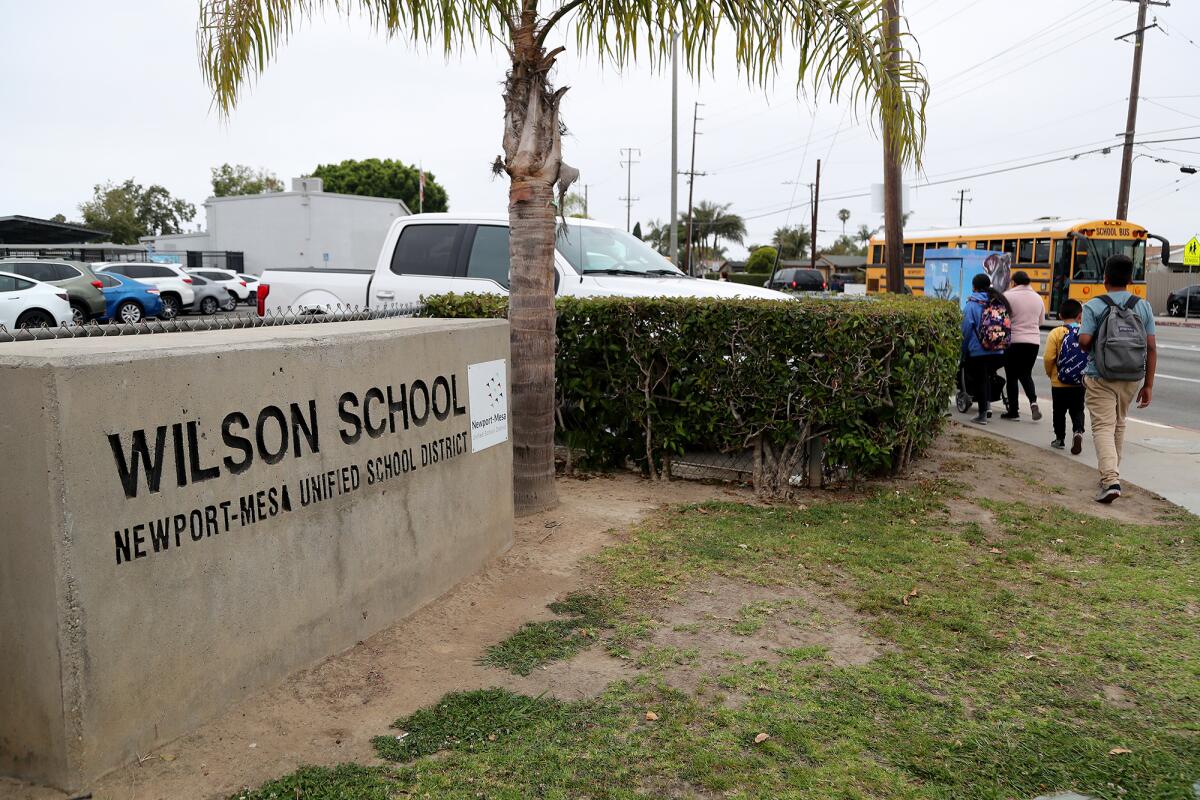Apodaca: Controversy over misplaced graphic novel detracts from larger issues

- Share via
Schools have long been lightning rods for controversy, and the past few years have certainly been no exception.
But not all controversies are created equal. Some are rooted in systemic problems that require a deep rethinking of educational policies and practices. Others are of the tempest-in-a-teapot variety — lesser events or issues that can easily be blown out of proportion.
The latter is how we might characterize a recent episode at Newport-Mesa Unified School District.
In May some parents discovered several copies of a graphic novel on the shelves of Wilson Elementary School’s library. The book, “Flamer” by Mike Curato, depicts an adolescent boy struggling with his identity while attending a Scouting camp during the summer before starting high school.
It contains references to homosexuality and suicidal ideation, and some characters use coarse language and anti-gay slurs. Intended for teenagers, the novel’s placement in an elementary school library was clearly a mistake.
Some parents are extremely upset. At a school board meeting in May, one parent described the book as “terrifying.” Others portrayed the incident as emblematic of bigger problems at the district, and called for the formation of a book review committee so that parents could pass approval on titles made available to students.
I requested an interview with someone from Newport-Mesa Unified administration to discuss the issue and received an emailed response from district spokesperson Annette Franco.
The books “are not part of our approved curriculum and are not deemed age-appropriate,” she wrote. The Wilson library had been closed and the district was undertaking a review of all books in all elementary school libraries. A committee had been convened, she said, to review the book-ordering process, which could lead to changes.
“This was an anomaly at one school and the employee involved is no longer with our school district. There is no further information to share at this time,” Franco wrote.
I sent a follow-up email, which went unanswered.
Patrice Apodaca compares the billionaire entrepreneur’s rigid views on being in the office to the nuanced thoughts of a dean at UC Irvine with.
It’s a touchy subject, and district administrators undoubtedly are reluctant to discuss it any more for fear of further stoking tensions — although I’d argue that full openness and transparency are always the wisest and most responsible policies, no matter the potential for blowback.
I decided to read the book to see what all the fuss was about.
“Flamer,” as author Curato explains, is a work of fiction but is largely based on his own experiences. The main character, “Aiden Navarro,” is a 14-year-old tortured not only by the bullies he left behind in middle school but also by new ones at a summer sleep-away camp. He is picked on for his appearance, his lack of athleticism and his mannerisms.
Some of the other boys are kind to him and offer friendship. Yet Aiden continues to feel like an outsider as he struggles with feelings he doesn’t understand, particularly when it comes to his compassionate tent mate. At one point he becomes convinced that the world would be better off without him.
Yes, there are mature themes, some foul words and sexual references, though I expect they represent the kind of language and behavior that most every kid by a certain age hears and sees regularly on playgrounds, and in locker rooms and school corridors.
But I also found the book to be hopeful and affirming — beautiful really. The illustrations are simple, and the story is told in a straightforward, heartfelt manner that reveals the kind of thoughts and emotions that many young people grappling with issues of identity, self-worth and belonging could well understand. Rather than “terrifying,” as one parent described it, I thought it was touching, relatable and inspiring.
I also read some reviews and reader responses, and many conveyed versions of the thought that “Flamer” could change lives for the better by providing a lifeline to teenagers who feel alone and misunderstood.
Do parents have a right to monitor their children’s reading materials? Absolutely. Was this particular book meant for placement in an elementary school library? Obviously not. Did the district respond quickly when the issue was called to its attention? It appears so.
Was any lasting harm done? I doubt it.
But here is the real heart of the problem, as I see it. I wish that the passion some parents displayed regarding this one book would be redirected to helping overcome a much larger, more damaging issue. Their energy could be used to fight for kids like the fictional Aiden, for there are plenty of them out there who are desperate to be seen, heard and accepted.
They are the young people who feel lost in a world that can be harsh and judgmental. Perhaps they are also struggling to understand who they are and how they fit in, and yes, that includes their sexuality and gender identity. Kids like that are more likely to become depressed and consider self-harm and suicide.
Those kids deserve empathy and understanding, and we can all play a part in advocating for programs and policies that provide structural support for them. We can also teach our children to reach out to other kids who might be hurting and could use a friendly gesture to help get them through the pain of feeling different.
There’s a reason a book like “Flamer” was written. Let’s keep our attention focused on that.
All the latest on Orange County from Orange County.
Get our free TimesOC newsletter.
You may occasionally receive promotional content from the Daily Pilot.





